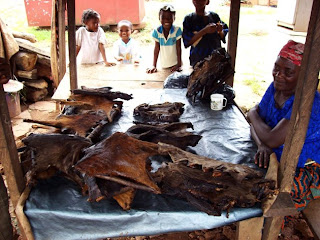In the news of the nauseating this weekend, the Centers of Disease Control (CDC) reports that illegally imported bushmeat confiscated at five major U.S. airports contained potentially dangerous bacteria. Items confiscated as part of the study included raw to semi-cooked animal parts, including those of primates like baboons and chimpanzees as well as various rodent species. The bushmeat was imported from Africa.
Among the pathogens identified in the products were a zoonotic retrovirus, simian foamy viruses, and several nonhuman primate herpesviruses. This presents a risk to humans as pathogens can spread from wild animals to people. In fact, some believe that HIV may have originally been transferred from apes to humans, and that a second AIDS-like epidemic is possible through this type of transmission, called zoonosis.
It’s not just bushmeat that poses a threat, but also wild animals imported as pets. A study conducted by EcoHealth Alliance showed that over a six-year period that began in 2000 approximately 1.5 billion live wild animals were legally imported into the country with 90% slated for the pet trade. I mean, who wasn’t shocked by the news of this loser releasing 56 exotic animals he was holding in captivity on his property in Ohio. Said Ian Lipkin, a researcher from Columbia University’s Mailman School of Public Health,
“Exotic wildlife pets and bushmeat are Trojan horses that threaten humankind at sites where they are collected in the developing world as well as the US. Our study underscores the importance of surveillance at ports, but we must also encourage efforts to reduce demand for products that drive the wildlife trade.”
The United States is one of the largest consumers of imported wildlife products and wildlife.
Some of the pathogens that can be contracted by humans zoonotically are:
- Ebola virus–found in chimps, gorillas and bonobos, and spread to humans by handling and consuming the meat of such great apes
- Monkeypox virus–found in the bushmeat of African squirrels from the Democratic Republic of the Congo
- Human Immunodeficiency Virus (HIV), the virus which causes AIDS, originated from a similar virus in primates called Simian Immunodeficiency Virus (SIV); researchers believe that HIV probably initially jumped into humans after people in Africa came into contact with infected bush meat. There are several distinct strains of HIV, indicating that this cross-species transfer has occurred several times.
The U.S. Fish and Wildlife Service has also reported that more than 55 million pounds (25 million kilograms) of wildlife products enter the country each year, with New York City being the most common port of entry followed by Miami, and Los Angeles.
All I can say is…c’mon people! What’s with the desire to own exotic animals as pets? This is such a cruel and idiotic practice, I don’t even know where to begin. I mean, the Florida everglades being invaded by Burmese pythons released by pet owners–duh! I’m sorry but I just don’t sympathize with people that get their faces bitten off by pet chimps. Not only is the practice of owning exotic animals and importing bushmeat a danger to the individual, but it puts us all at risk. Both these practices need to be outlawed and severely punished. Offenders of this nature are savages in my book. Try evolving, dammit.














